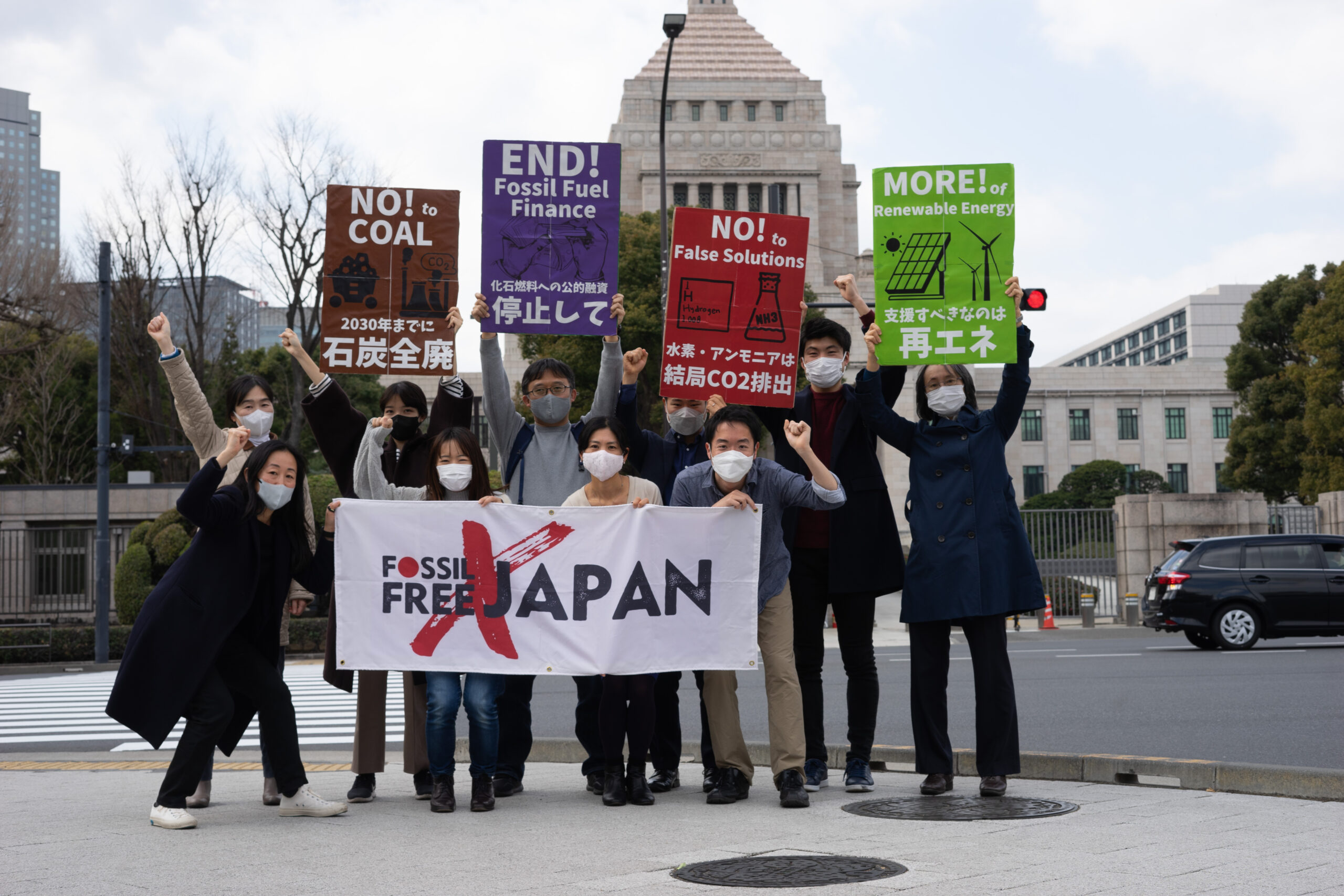
Tokyo/Manila/Jakarta –
Over 140 groups from 18 countries have issued an open letter calling on Japanese Prime Minister Fumio Kishida to stop promoting and expanding the use of fossil fuels and derailing the transition to renewable energy across Asia. The letter was sent ahead of the Asia Zero Emissions Community (AZEC) Ministerial Meeting in Tokyo which the Japanese government is hosting on March 4, to bring together energy ministers from across Asia to discuss Japan’s plans for decarbonization and cooperation on the energy transition.
With the climate crisis intensifying day by day, from deadly floods in Pakistan to supercharged typhoons in the Philippines, the urgency of a swift, just and equitable transition from fossil fuels is clear. As one of the world’s wealthiest nations and top contributors to the climate crisis, Japan has a responsibility to end its support for fossil fuels and to help countries transition to clean energy.
However, Japan’s recently approved “Green Transformation” policy relies heavily on the use of fossil fuel-based technologies, including gas/LNG, co-firing of ammonia, hydrogen and carbon capture and storage.
Japan should not promote such “false solutions” but seek ways to cooperate in bringing swift, just and equitable transition into renewable energy at the AZEC Ministerial Meeting and at the following G7 Summit in Hiroshima in May.
“The struggle for climate justice is an intense race against time and huge challenges,” says Lidy Nacpil, co-coordinator of APMDD. “Japan must stop investing in gas as a transition fuel and promoting ammonia and hydrogen which will prolong our reliance on fossil fuels and delay the decarbonization process. It is possible, feasible and practical to shift directly to renewable energy. Japan must stop being a huge part of the problem and fulfill its obligations to communities suffering the most from the climate crisis. What Japan does in the coming months and years will have a huge impact on our communities and on our planet.”
Ayumi Fukakusa, deputy executive director of Friends of the Earth Japan points out that Japan’s GX, or green transformation strategy is a green washing strategy. “Japan’s GX strategy is pure greenwashing. It will block the transition to renewable energy, worsen the climate and energy crises and harm communities and ecosystems. Technologies like fossil hydrogen or ammonia are only designed to serve the interests of fossil fuel corporations. ”
Japan must stop derailing the energy transition of other countries. Japan International Cooperation Agency’s plan (JICA) is drafting the integrated energy and power master plan for Bangladesh as part of their technical assistance program which is not in line with the 1.5 degree climate goal and is leading countries towards more dependence on fossil fuels.
Hasan Mehedi, Chief Executive of CLEAN, says “Japan’s draft energy plan for Bangladesh ignores renewables in favor of coal and LNG. People are already suffering from the impacts of the climate crisis and reliance on expensive imported fossil fuels. Dangerous and costly gas, fossil hydrogen and ammonia won’t help people. They are “false solutions” that deepen the crises further.”
“JICA developed a flawed roadmap for Indonesia to achieve carbon neutrality by 2060, strongly promoting ammonia co-firing, hydrogen and CCUS. In fact, Japanese corporations, such as Mitsubishi Heavy Industries, are conducting feasibility studies on ammonia co-firing at existing coal power plants. The extended operation of coal plants would prolong not only the use of fossil fuel but also the adverse health and livelihood impacts on communities nearby coal power plants as well as coal mining. Japan must stop forcing and financing other countries to rely on such false solutions” says Fanny Tri Jambore, mining and energy campaign manager of WALHI.
Makiko Arima from Oil Change International says “Japan is the leading public financier of gas infrastructure globally. Between 2019 and 2021, Japan spent 6.7 billion USD on gas projects on average each year. The Japanese government is pushing LNG and other fossil-based technologies in Asia for energy security and climate change measures but it has the opposite effect. Dependence on LNG makes countries vulnerable to volatile gas price, delays the transition to renewable energies and accelerates the climate crisis further.”
There is growing opposition to LNG and gas buildout across the region. In the Philippines, a massive build out of gas infrastructure is planned in the Batangas region.”In the Philippines, 34 new gas power plants and 11 new LNG import terminals are planned. Japan Bank for International Cooperation, Osaka Gas, Tokyo Gas, Mizuho and JERA are among those who are behind those LNG build out. LNG/gas is dirty and a climate buster and is destroying rich livelihoods, rich ecosystems and thriving businesses. Like coal, gas will be a stranded asset and will be resisted by communities in the Philippines and across Southeast Asia. Our region is home to vast renewable energy potential and we want Japan to invest in this instead of prolonging investments in fossil fuels” says Gerry Arances, Director of the Center for Energy, Ecology, and Development.
See full open letter here.
Contact
Friends of the Earth Japan
info@foejapan.org

